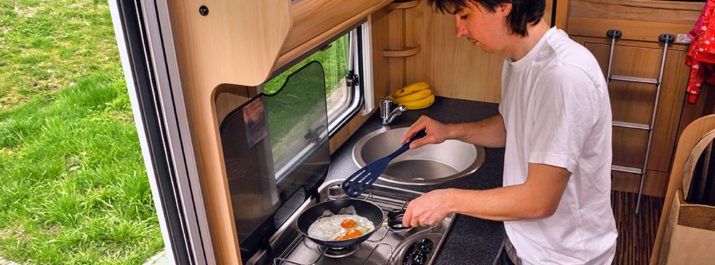A key part of RV ownership and lifestyle is propane. Propane gas provides a means to enjoy conveniences while you are camping such as bathing with hot water, cooking and keeping warm to avoid the winter chill in your RV. However, you must never forget that propane is a hazardous gas. No matter how accustomed you become to using propane, remembering to practice RV propane safety is also a key part of RV ownership and lifestyle.
Why You Can’t Ignore RV Propane Safety
Propane is a naturally odorless, colorless, and undetectable gas. Because it is so widely used for fuel, most commercial propane contains additives to make it obvious during a leak. While this is a precautionary measure, propane is still dangerous. Practicing RV propane safety is, therefore, of paramount importance.
Exposure to propane can lead to short-term health issues. It also has the potential to be deadly both from exposure to it in large amounts which can displace oxygen and resultin asphyxiation, and because of its extremely flammable properties.
While exposure in low concentrations in well-ventilated areas is not harmful, some of the side-effects of exposure to large amounts of propane include:
- Weakness
- Irregular heartbeats
- Nausea
- Dizziness
- Convulsions
Practicing RV Propane Safety
Before Travel
Make it a habit to inspect your propane tanks on a regular basis for corrosion, damage or leaks. If you suspect your tank is compromised in any way, replace it. For RVs with a permanently installed tank, replacement should be done by a certified technician.
Inspecting propane tanks should be part of every pre-trip checklist, and most importantly after winter storage for your RV. Inspect everything from the tank to hoses and anywhere the propane connects. Use a solution of half dish soap, half water to check for leaks. Brush this solution onto all hose connections and valves. A leak is indicated if bubbles appear. Immediately shut off gas at the tank, tighten connections, and re-check for leaks.
Install detectors for carbon monoxide and fire to help prevent risks related to propane and the fire it fuels. It is important to regularly test both types of detectors to ensure they are properly working. Also check and clear ventilation in your RV to ensure proper airflow. This includes dust, debris, bugs, twigs, leaves, or anything else that can restrict proper venting. Finally, make sure your RV has at least one fire extinguisher.
You may occasionally “freshen up” your RV and be tempted to touch up the paint on your propane tank. Resist that temptation. It is never a good idea to paint the cylinders, hardware, or valves, as it could result in system failure. An annual inspection by a certified service technician is recommended.
During Travel
An important part of RV propane safety is not to use your propane during travel. There is an increased risk of propane connectors being jarred loose or damage occurring to the tank while traveling. Be sure to turn off all propane while driving.
The appliances in your RV that use propane, including the refrigerator, don’t necessarily need active propane while you’re on the road. Even a fridge can maintain its interior chill for hours after being disconnected from its fuel source, as long as you leave it closed. You may also be able to switch over to battery power. This can keep the refrigerator cold throughout your trip.
When not standing upright, the tank becomes a major risk. This makes accidents on the road even more dangerous. When refueling, be sure to shut off all related appliances, close valves and turn off pilot lights. Finally, certain areas restrict the use of gas, so be sure to comply in areas such as military zones and tunnels.
While You Camp
Air flow is critical for propane use and RV propane safety, so keep the area around any propane sources or appliances as clear as possible. Additionally, open a window when cooking and utilize the exhaust fan to ensure adequate ventilation.
Park a safe distance – at least 10 feet – away from heat sources such as the campfire. Remember to take propane seriously. Any appliances that use propane should be used only for their intended purposes.
Remember, there is also the additional safety feature built right into propane. The additive in propane gives it an odor like rotten eggs. So, if you notice this smell, turn off any sources of heat, fire or electricity that you can. Evacuate your RV and contact emergency services.
When you follow these precautions, propane provides a wonderful source of warmth, cooking and hot water for bathing. When RV propane safety is part of your normal camping routine, you can enjoy your travels without worry.
Contact RV Wholesale Superstore
The professionals at RV Wholesale Superstore are ready to help you find the perfect RV for you and your family. Visit us in-person at 5080 W. Alexis Road, in Sylvania, OH or call us at (419) 786-1126
Connect with us on Social Media!


